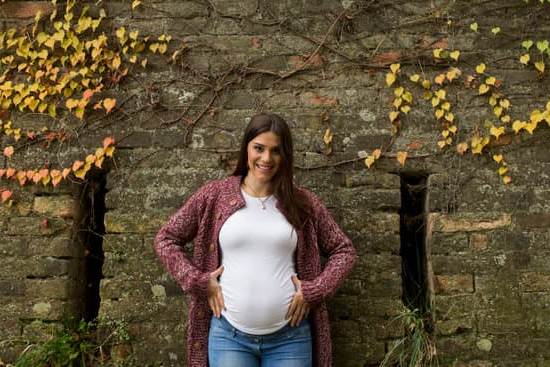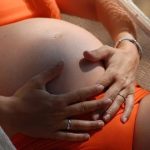What is a geriatric pregnancy? This question may arise for women who are expecting a child at an older age. In this article, we will delve into the concept of geriatric pregnancy, exploring the reasons behind its classification and the various factors that come into play when it comes to fertility and prenatal care for older expectant mothers.
A geriatric pregnancy, also known as an advanced maternal age pregnancy, refers to a pregnancy in which the mother is 35 years of age or older. While the term “geriatric” may sound alarming, it is simply a medical classification based on age and not an indication of a woman’s overall health or ability to have a healthy pregnancy. It is important to understand the unique considerations and challenges that can arise during such pregnancies.
As women choose to have children later in life for various reasons, it becomes crucial to address the specific needs and potential risks associated with geriatric pregnancies. From fertility issues to increased health risks, there are several aspects that need to be carefully considered and managed for a successful and healthy pregnancy journey. In this article, we will explore these aspects in detail and provide insights into navigating the complexities of geriatric pregnancies.
Age and Fertility
Understanding Age and Fertility
As women age, their fertility naturally declines. This is due to a decrease in the quantity and quality of eggs, making it more difficult to conceive. For women over the age of 35, this decline becomes more pronounced, leading to challenges when trying to get pregnant. While it is still possible for women in this age group to conceive naturally, the process may take longer and require more effort compared to younger women.
Challenges Faced by Women Over 35
Women over the age of 35 may experience a number of challenges when trying to conceive. Irregular menstrual cycles, hormonal imbalances, and an increased risk of underlying health conditions can all impact fertility. Additionally, the likelihood of miscarriage also increases with age, making the journey to pregnancy even more stressful for older women. These factors contribute to why pregnancies in this age group are often referred to as “geriatric pregnancies” due to the unique challenges they present.
Seeking Assistance
For women over 35 who are struggling with fertility, seeking assistance from a fertility specialist or reproductive endocrinologist can be beneficial. These professionals can assess a woman’s individual situation and provide guidance on potential treatments or assisted reproductive technologies that may improve her chances of conceiving. It’s important for women facing these challenges to know that they are not alone and that there are medical interventions available to help them achieve their goal of becoming pregnant.
As we continue our discussion on geriatric pregnancies, it’s crucial to understand the specific challenges faced by older women when it comes to conceiving and how age impacts fertility. By addressing these issues, we can better support and assist women who are navigating pregnancy later in life.
Risks and Complications
Age and Fertility
As women age, their fertility naturally declines. This decrease in fertility is due to a variety of factors, including a lower number of viable eggs, decreased egg quality, and changes in hormone levels. For women over the age of 35, conceiving can be more challenging, as the likelihood of infertility or difficulty getting pregnant increases. As a result, many women may turn to assisted reproductive technologies such as in vitro fertilization (IVF) to help overcome these obstacles.
Health Risks and Potential Complications
Geriatric pregnancies are associated with an increased risk of various health complications for both the mother and the baby. Preeclampsia, a condition characterized by high blood pressure and potential damage to organs such as the liver and kidneys, is more common in older expectant mothers.
Additionally, gestational diabetes, which develops during pregnancy and affects blood sugar levels, is also more prevalent in geriatric pregnancies. These conditions can have serious implications for both maternal and fetal health, necessitating careful monitoring and management throughout pregnancy.
Impact on Baby’s Health
In addition to the risks faced by the mother, geriatric pregnancies are also linked to an increased likelihood of chromosomal abnormalities in the fetus. The chance of having a baby with Down syndrome or other genetic disorders rises as women get older.
This highlights the importance of thorough genetic screening and testing during pregnancy to identify any potential issues early on. Despite these challenges, it is essential for expectant mothers undergoing geriatric pregnancies to receive appropriate prenatal care and support to ensure a healthy outcome for both themselves and their babies.
Overall, understanding the unique risks and complications associated with geriatric pregnancies is crucial for women who are considering or experiencing pregnancy at an advanced age. With proper medical supervision and support, it is possible to navigate these challenges effectively and achieve a successful outcome for both mother and baby.
Genetic Testing
As women age, the risk of chromosomal abnormalities and genetic disorders in the fetus increases. This is why genetic testing plays a crucial role in geriatric pregnancies, offering expectant mothers valuable information about the health and development of their baby. Here are some key points to consider when it comes to genetic testing for older mothers:
1. Importance of Early Testing: Genetic screening and testing should ideally be carried out during the first trimester to assess the risk of chromosomal abnormalities such as Down syndrome, trisomy 18, and trisomy 13. Early detection can provide expecting parents with more time to make informed decisions about their pregnancy and potential next steps.
2. Types of Genetic Testing: There are different methods of genetic testing available for older expectant mothers, including non-invasive prenatal testing (NIPT), nuchal translucency ultrasound, chorionic villus sampling (CVS), and amniocentesis. Each method has its own benefits and limitations, and it’s important for women to discuss these options with their healthcare provider to determine the best course of action for their individual circumstances.
3. Counseling and Support: It’s essential for women undergoing genetic testing during a geriatric pregnancy to receive comprehensive counseling and emotional support throughout the process. The results of these tests can be emotionally challenging, and having access to professional guidance and resources can help women navigate any difficult decisions that may arise.
Prenatal Care
Prenatal care is of utmost importance for women undergoing a geriatric pregnancy, which refers to pregnancy in women who are 35 years old or older. Due to the increased health risks associated with pregnancy at an older age, regular medical supervision and prenatal care become crucial in ensuring the well-being of both the mother and the baby.
Women undergoing a geriatric pregnancy are more likely to experience complications such as gestational diabetes, hypertension, and preeclampsia. These conditions can have serious implications for both the mother’s health and the development of the fetus. Therefore, early detection and proper management through regular prenatal check-ups are essential in minimizing these risks.
During prenatal visits, healthcare providers monitor various aspects of the mother’s health, including blood pressure, weight gain, and glucose levels. They also conduct routine ultrasounds and prenatal screenings to assess fetal development and detect any potential abnormalities. In some cases, additional testing may be recommended based on individual risk factors.
In addition to medical examinations, prenatal care also involves counseling and education for expectant mothers. Women undergoing a geriatric pregnancy may receive guidance on nutrition, exercise, childbirth preparation, and potential lifestyle modifications to promote a healthy pregnancy. The support and expertise provided during prenatal care play a crucial role in optimizing maternal and fetal outcomes for women experiencing a geriatric pregnancy.
Support and Resources
Today, women are choosing to start families later in life, leading to an increase in geriatric pregnancies. A geriatric pregnancy, also known as an advanced maternal age pregnancy, refers to a pregnancy that occurs in women who are 35 years of age or older. This shift in family planning has led to the need for more support and resources for women undergoing geriatric pregnancies.
Support and resources play a crucial role in helping women navigate the unique challenges and concerns that come with geriatric pregnancies. Here are some valuable support and resources available for women going through a geriatric pregnancy:
- Support Groups: Joining a support group specifically tailored to geriatric pregnancies can provide women with a sense of community and understanding. Interacting with other expectant mothers who are facing similar experiences can offer emotional support and helpful insights.
- Counseling Services: Professional counseling services can be beneficial for women undergoing geriatric pregnancies, as they may have additional worries or fears about their age and potential risks during pregnancy. Counseling can help alleviate anxiety and provide coping strategies.
Delivery and Postpartum
As women age, their bodies experience natural changes that can affect childbirth. For women undergoing a geriatric pregnancy, defined as pregnancy that occurs in women over the age of 35, there are potential challenges during childbirth that need to be addressed.
One such challenge is an increased risk of complications during labor, including prolonged labor, fetal distress, and the need for a cesarean section. These risks are often due to factors such as decreased uterine muscle elasticity and higher rates of chronic medical conditions that can impact delivery.
Additionally, postpartum care is crucial for both the mother and the baby after a geriatric pregnancy. Older mothers may take longer to recover from childbirth due to slower healing processes, making postpartum care especially important. It includes monitoring for any complications such as infection or excessive bleeding, providing support for breastfeeding if desired, offering emotional support to navigate this new phase of life, and ensuring proper infant care.
It is important for older mothers to be aware of these potential challenges and plan accordingly with their healthcare providers. Adequate prenatal education on what to expect during childbirth and postpartum recovery can help mitigate some of these challenges and lead to a more positive experience for both mother and baby.
| Potential Challenges During Childbirth | Postpartum Care Needed |
|---|---|
| Increased risk of complications | Monitoring for infection or excessive bleeding |
| Prolonged labor | Support for breastfeeding if desired |
| Fetal distress | Emotional support for navigating new phase of life |
Personal Stories
When it comes to discussing geriatric pregnancies, personal stories and experiences from women who have undergone this unique journey can provide valuable insights and perspectives. These real-life accounts offer a relatable and authentic look at what it means to have a geriatric pregnancy, shedding light on the challenges, triumphs, and emotions that come with it.
One common theme in many personal stories of geriatric pregnancies is the initial surprise or uncertainty that accompanies the news of expecting later in life. Women often share their experience of grappling with the societal stigma attached to being an older mother, as well as the concerns about their own health and the health of their babies. These narratives can help other women in similar situations feel understood and less alone in their feelings.
Furthermore, personal stories often touch upon the physical and emotional aspects of navigating a geriatric pregnancy. From managing increased medical appointments and tests to addressing fears and anxieties about childbirth and parenting, these firsthand accounts offer a candid look at the various facets of this unique reproductive journey. They also highlight the resilience, strength, and joy that many women find amidst the challenges of having a geriatric pregnancy.
Overall, sharing personal experiences of geriatric pregnancies serves not only to educate and inform others about this topic but also to foster a sense of community and solidarity among women who may be facing similar circumstances. These stories can provide support, encouragement, and hope for those undergoing a geriatric pregnancy by showing that they are not alone in their experiences.
| Geriatric Pregnancy Experiences | Benefits |
|---|---|
| Real-life stories | Provides insight into challenges |
| Emotional support | Offers encouragement for those facing similar situations |
| Fosters sense of community | Shows that women are not alone in their experiences |
Conclusion
In conclusion, a geriatric pregnancy, also known as an advanced maternal age pregnancy, refers to a pregnancy in women who are 35 years or older. This term is used due to the potential increased risks and challenges that can arise for both the mother and the baby during this stage of life.
We have discussed how age can impact fertility, leading to difficulties in conceiving for women over 35. Additionally, we have explored the higher health risks and potential complications associated with geriatric pregnancies, such as preeclampsia and gestational diabetes.
It is important for women undergoing a geriatric pregnancy to prioritize prenatal care and medical supervision to ensure a healthy pregnancy and baby. Regular check-ups, genetic screening tests, and attention to any existing health conditions are crucial in managing potential risks and complications. Support groups, counseling services, and resources designed specifically for women experiencing a geriatric pregnancy are also available to provide emotional and physical support during this unique phase of life.
While there may be challenges associated with a geriatric pregnancy, it is essential to recognize that many women go through this experience successfully with proper medical care and support. By understanding the distinct needs of older expectant mothers and addressing them accordingly, healthcare providers can help ensure positive outcomes for both the mother and the baby during a geriatric pregnancy.
Frequently Asked Questions
Is Geriatric Pregnancy Considered High Risk?
Geriatric pregnancy is considered high risk due to increased likelihood of pregnancy complications such as gestational diabetes, hypertension, and chromosomal abnormalities. It’s important for older mothers to receive specialized prenatal care.
Is 37 Too Old to Have a Baby?
While 37 isn’t necessarily too old to have a baby, it is considered an advanced maternal age pregnancy, which comes with increased risks. Many women are able to have healthy pregnancies and babies at this age with proper medical care.
Is 32 a Geriatric Pregnancy?
The medical term “geriatric pregnancy” typically refers to pregnancies in women aged 35 or older, so at 32, a woman would not be classified as having a geriatric pregnancy. However, any pregnancy after the age of 35 still carries some increased risks compared to younger women.

Welcome to my fertility blog. This is a space where I will be sharing my experiences as I navigate through the world of fertility treatments, as well as provide information and resources about fertility and pregnancy.





